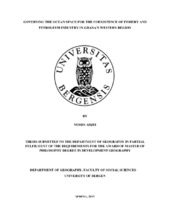Governing the ocean space for the coexistence of fishery and petroleum industry in Ghana’s Western Region
Master thesis

View/
Date
2017-06-21Metadata
Show full item recordCollections
- Department of Geography [634]
Abstract
Ghana began commercial oil and gas production in the year 2010 in the country’s Southwestern coast where fishing is an important economic activity. There have been growing concerns especially from the coastal fishing communities about the negative impacts of the petroleum extraction activities on their fish catch and general livelihoods. This study sought to understand how the fisheries governance institutions in Ghana (at the local, regional and national levels) are addressing the concerns and conflicts regarding the impacts of petroleum extraction activities on fishing in Ghana. Adopting a qualitative research approach, data were produced through interviews with thirty-seven informants in the fisheries and petroleum sectors as well as actors at the local (traditional), governmental and non-governmental fisheries governance organizations in Ghana through participant observation, group interviews and key informant’s interviews. It emerged that, development programmes such as; the provision safe drinking water facilities, health and educational supports have been undertaken by the petroleum industry through their Corporate Social Responsibility (CSR) projects especially within communities in the oil companies demarcated zone of influence. Irrespective of these projects, several concerns were expressed by the fisher folks in Axim, which were differently viewed by the other stakeholder groups. From this study, two main discursive positions emerged. Whereas the fisher folks stressed the negative impacts of the petroleum extraction resulting in their declining fish catch, officials of petroleum companies argued that the impacts of their activities in causing declining fish catch was negligible but rather the bad fishing practices by the fishermen themselves led to the declining catch. Similar views were also expressed by officials of the government organizations interviewed. The government officials emphasized the need for strict fisheries rules to conserve Ghana’s fish stock as well as the protection of the offshore petroleum installations which serve as an important source of revenue to the government. The various ways of addressing these conflicts and their implications for the various stakeholder groups are discussed in light of the common pool resource theory as well as the theories of institutions, power, discourse and stakeholder images used for this study.